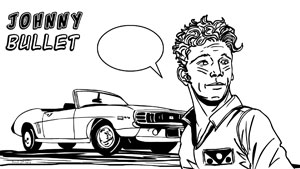|
|
 |
One of the people he spoke with, identified as Darth Nihilus, was able to turn the tables on him somewhat, only to then be accused of being confrontational. The Star Wars fan was able to demonstrate that a non-Star Wars fan at a Star Wars convention becomes the outsider. To visit a geek-centric event with the intention of spreading scorn and ridicule is doomed to backfire, because if you plan to behave like a jerk, you should also plan to be treated like a jerk.
You can listen to the clip here. Go ahead; I’ll wait.
I became a comic book fan in the early 1970s, just as Star Trek fandom was gaining traction, and long before the age of Star Wars. So I have literally had decades to develop a thick skin to all the derision and bullying that my chosen passion has caused. I long ago accepted I am a geek, or nerd, or whatever label you prefer. In an early episode of Game of Thrones, Tyrion Lanister tells John Snow, “Embrace what you are. That way, no one can ever use it against you.”
Recently, a co-worker made a disparaging comment about my comic book fandom, all in good-natured ribbing. After my less-than-serious indignation, he pointed out that he doesn’t take it seriously because I don’t take it seriously. There was a time when I was a “serious collector,” but having sold various comic books over the years, I’ve learned I’m unlikely to ever realize the monetary value some people assign to them.
There are those who view comic books as art, and I will agree that overall, comics are an art form. But art enters into comic books the same way physical fitness enters into football. It’s a key ingredient for the professionals, but to the audience, it’s not so important.
I recognize that I am part of the audience, and as the end user, my primary concern is how much enjoyment I receive from any given story. To me, comic books are first and foremost a form of entertainment, nothing more. Perhaps if I were involved in the creative process, I might feel differently. The same would apply to film. No matter how much artistic effort goes into a movie, my first criteria is whether or not I find it entertaining
And that’s all any hobby is; a means of occupying time between work and sleep. Certainly, it can sometimes evolve into a career. If you can find a way to be paid for something you would do for free, more power to you. Everyone has their chosen passion; American public libraries have built an entire PR effort with their “I geek...” campaign, and my hobby is no more valid – or any less valid – than any other’s.
 |
 Is there much of a difference here? |
Ironically, in the past, I have witnessed football fans, complete with body paint in the colors of their chosen team, criticizing various sci-fi geeks or comic book nerds dressed in full costume. “Hello, Kettle? This is pot. You’re black.”
There is also a Baptist convention that is held at some of the same hotels as Dragon*Con, with a small overlap on Labor Day. A few years back, a friend of mine found himself on an elevator with a couple of ladies from the convention who were trying to locate a specific function for their event. My friend graciously offered to guide them. As the three of them made their way through a dwindling crowd of Klingons, Jedis, X-Men and orcs, the two women made judgmental comments concerning the Dragon*Con crowd.
My friend took the opportunity to pick up a copy of the convention’s daily newsletter, which reported a record amount of blood collected in Dragon*Con’s annual blood drive. He then asked the women how much blood their attendees contributed.
 |
I am generally tolerant of people’s interests, though I have no issue throwing people’s words back at them in an effort to keep us on an even level. A gay man at Dragon*Con told me, “These are the kind of people I made fun of in high school.” I responded by saying, “That’s okay. I made fun of your kind in high school too.”
(Before I get too much hate mail for that remark, let me remind readers that I did that IN HIGH SCHOOL. I am now less ignorant and more tolerant. It’s called evolution. Try it sometime.)
As for those who still feel intimidated by the mundanes of the world who laugh at you for having spent a couple hundred dollars on a faux light saber, let me close with this thought: Whether you feel disenfranchised because you’re a Trekkie, or gay, or for whatever reason, Tyrion Lanister’s advice still sounds pretty good to me.
© Copyright 2002-2025 by Toon Doctor Inc. - All rights Reserved. All other texts, images, characters and trademarks are copyright their respective owners. Use of material in this document (including reproduction, modification, distribution, electronic transmission or republication) without prior written permission is strictly prohibited.

